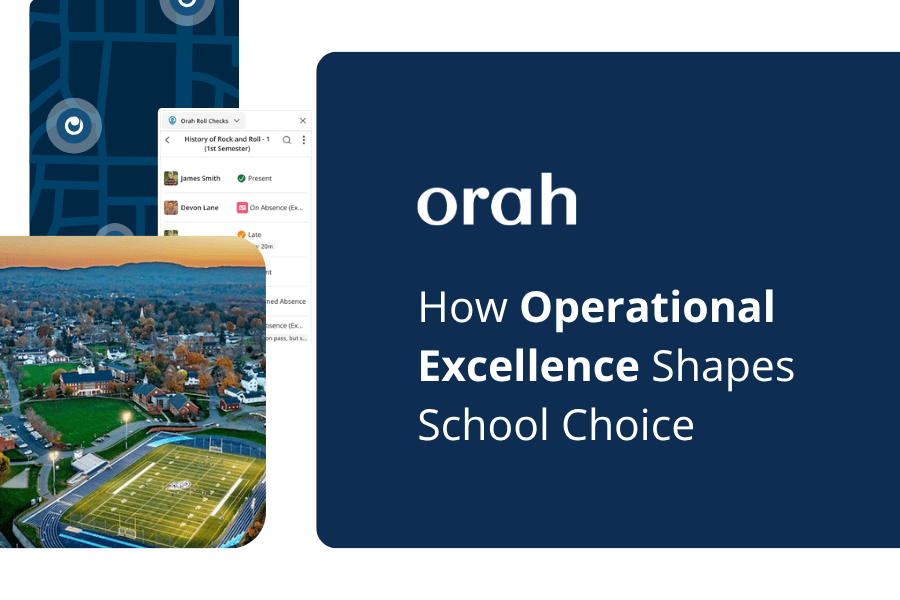The Importance of School Administration: 3 Reasons Why It's Crucial For Student Education
The Orah Team
•
October 21, 2024

A successful school is about much more than teaching. While good teaching and learning are crucial, the administration that underpins it is key to providing a well-rounded education that encompasses the whole child. An effective school administrator and operations support an education that goes well beyond imparting knowledge. School operations teams ensure that students’ daily needs are met; that they receive healthy and nutritious meals, sleep and learn in a safe environment, and receive appropriate medical care and mental health support. Beyond the day-to-day, the administrative team are often the ones responsible for recording, checking and analysing student data, so the can to enable those responsible for both learning and wellbeing to tailor their approach to the needs of the student.
Here are 3 reasons why effective school administration is so important for student education.
1. The Role of School Administrators
School administrators play a vital role in the success of educational institutions. They are the backbone of daily operations, ensuring that students receive a quality education in a safe and supportive environment. From principals to assistant principals, these leaders manage school staff, develop and implement policies, and allocate resources to enhance student learning.
Effective school administrators are not just managers but skilled leaders with strong communication and interpersonal skills. They possess emotional intelligence and strategic thinking, enabling them to build and maintain relationships with teachers, students, parents, and the broader community. Their commitment to promoting student achievement and well-being is unwavering.
Moreover, school administrators are instrumental in fostering a positive school culture and climate. They create a sense of community and belonging, encourage open communication and feedback, promote diversity and inclusion, and recognize and reward the efforts of both staff and students. This holistic approach is crucial for nurturing an environment where students can thrive.
2. Key Qualities of Effective School Leaders
We know that effective school leadership influences student learning outcomes. Effective school leaders possess a range of key qualities that enable them to drive student achievement, positive attendance and student well-being. These qualities include:
- Strong Communication and Interpersonal Skills: Effective school leaders communicate clearly and effectively with teachers, students, parents, and the broader community, ensuring everyone is on the same page.
- Emotional Intelligence and Empathy: Leaders who understand and manage their own emotions, as well as those of others, build stronger relationships and promote a positive school culture.
- Strategic Thinking and Problem-Solving: The ability to think critically and strategically allows school leaders to develop and implement effective solutions to complex problems.
- Adaptability and Flexibility: Leaders who can adapt to changing circumstances and priorities are better equipped to promote student achievement and well-being.
- Passion for Education and Student Success: Effective school leaders are deeply committed to education and learning, driving them to promote student achievement and well-being passionately.
These qualities are essential for school leaders to navigate the complexities of educational administration and to create an environment conducive to student success.
1. Allows Teachers To Focus On Teaching
Having robust systems, policies and procedures in place ensures that teaching and learning flows as smoothly as possible. Crucial information such as assessment results, attendance and pastoral data and lesson observations informs tailored teaching strategies to help children achieve as highly as possible. Administrators ensure data is entered in a timely manner, presented to teachers in an easy-to-use fashion and combine different datasets into one effective plan. This allows teachers to focus on their lessons and prioritise student outcomes and achievement, instead of getting tied up with the administrative load required to access such important information. The collection and appropriate presentation of data allows schools to open communication channels with parents, giving them an understanding of their child’s progress so that they can engage in useful conversations with teachers to support their child’s progress. Similarly, presenting academic data appropriately to students helps them to be a part of their learning strategy and goal setting, supported by the experience of their teachers.

Effective school administration empowers school leaders to make informed decisions and supports student goal-setting, positive attendance and academic achievement.
2. Administration Promotes Accountability

Parents select a school because they believe it will provide their children with the best possible education and start to their future careers. From a marketing perspective, parents are as important to school principals as the students. Parents are the ones who will continue to choose the school for younger siblings or make recommendations to their friends. For this reason, educational institutions (led by their school principals) must ensure they have well-documented processes, procedures and record-keeping. Detailed school records provide parents with peace of mind that their child’s academic and personal development is being looked after, as well as their general safety and daily well-being. Additionally, principals affect students by driving improvements in academic performance through effective leadership, as documented in numerous studies over the past two decades. School administrators play a key role in managing communications with parents via setting up and managing reporting procedures. They also ensure that parents have easy access to their child’s information.
5. Building a Positive School Culture
Building a positive school culture is critical for student success. A positive school culture is one where students feel valued, respected, and supported, allowing them to learn and grow in a safe and nurturing environment.
School administrators play a key role in cultivating this culture. They foster a sense of community and belonging by encouraging collaboration and teamwork among teachers and students. Open communication and feedback are promoted, creating opportunities for everyone to share their thoughts and ideas.
Diversity and inclusion are also at the forefront of a positive school culture. School administrators celebrate different cultures and backgrounds, providing opportunities for students to learn about and appreciate various perspectives. Recognizing and rewarding staff and students is another crucial aspect, with professional development opportunities and celebrations of student achievements and successes.
By building a positive school culture, school administrators can significantly enhance student achievement and well-being, creating a supportive learning environment that benefits all students.
3. Administration Informs Decisions
Good data supports the vision and decision-making of the school leadership team. An effective administration department is able to extract and analyse key data to inform a school’s strategic decisions around education provision.

School leaders cannot remain static but must adapt and change their vision and processes as the world of education embraces new challenges and fresh technologies. Effective data analysis shows the leadership team where the school’s strengths and weaknesses currently lie, enabling them to understand the knowledge and skills they need to focus on embedding, and at what stage of a pupil’s education, ultimately aiming to improve student outcomes.
An effective administration team must be supported by effective software that understands how the school functions. Orah has been built in conjunction with some of the world's leading schools to make some of the most critical aspects of school administration, knowing where your students are, easy to achieve. Our cloud-based technology supports data entry and analysis from any location when your team need it most. Our easy-to-use interface takes the hassle out of student attendance and makes it easy to share accountability for attendance with the students and families, letting your team focus on how they can best support your students.
Get a free demo to learn more about Orah's world-class tools for attendance management, well-being and communications.
Download your guide to knowing where students are
When you sign up, we'll send you a guide detailing what it takes to setup your daily operations to maintain student location awareness using your routine school processes like attendance, student leave, late arrivals, early dismissals & emergencies. You'll also recieve an invite to join the Orah community and get the quarterly newsletter.














